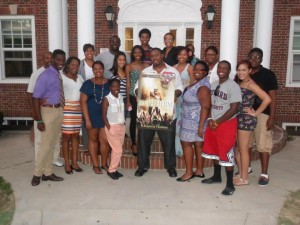
Courtesy of Willie Roberson
The Douglass Leadership House (DLH) has been received largely positively by the campus community since moving onto the Fraternity Quadrangle in August. The house was formerly occupied by the Delta Upsilon (DU) fraternity.
“I believe students now see with clarity what DLH is hoping to accomplish through their mission,” Associate Director of Student Leadership Programs Ed Feldman, who has worked with DLH “on occasion,” said, also noting that he believes the group has gained respect through this increased understanding.
Associate Dean of Students Anne-Marie Algier agreed.
“I think [DLH] has gotten off to a great start,” she said. “I do think they are accomplishing what they spoke of in their application.”
DLH President and sophomore Amber-Danielle Baldie felt similarly.
“I feel, like since people didn’t really know who we are, we just need to identify ourselves,” she said.
The organization was formed last year by a group of four students — Sharese King ’12, Melika Butcher ’12, Tsion Gurum ’12 and Lecora Massamba ’11, who was a Take Five Scholar last year — with guidance from Political Science Professor Valeria Sinclair-Chapman and Academic Program Coordinator for Minority Student Affairs Sasha Eloi.
The group states that its mission is to “create an engaged intellectual community where students of diverse backgrounds can come together in a supportive environment to nurture their leadership skills and to learn more about African-American culture, history, politics and diasporic roots.” There are four separate project groups under the umbrella organization that each focus on a different subject matter: culture and the arts, leadership models, conflict resolution and community outreach.
Sinclair-Chapman explained that DLH’s overall goal is to establish the house as a resource for conversations on a number of diverse topics and act as a catalyst for engagement in the University community, as well as simply contributing to a sense of community on campus by being a “good neighbor” and a “good resource.” Eloi added that she hopes it will provide students with the opportunity to become better leaders and that DLH will work with different organizations on campus to explore new arenas.
Overall, Eloi believes DLH has been received positively.
“I think they’ve had great support, not just from administration and faculty, but from other students on campus as well,” she said.
Sinclair-Chapman agreed, saying that “things are going pretty well.”
DLH has 21 in-house members, as well as a number of members who do not live in the house, but still associate themselves with the group in other ways. Baldie said that DLH intends to open itself to all members of the UR community, even those who aren’t interested in joining DLH.
“We want to be as [inclusive] as possible,” she said.
Baldie explained that DLH is always looking to increase diversity, which will in part allow the group to reach out to more people and fulfill their mission of education.
Eloi emphasized the fact that DLH was always thought of as an opportunity for all students.
“It was never presented as something that was a secret or closed opportunity,” she explained.
DLH has held a number of events on campus since the start of the semester which have had large turnouts, according to DLH Vice President Willie Roberson, including a voter registration drive, an open house during Meliora Weekend and multiple discussions on different topics, such as “real women have curves,” among others. They have co-sponsored with many different groups on campus, including the Midnight Ramblers, Vocal Point and the Religion and Classics Undergraduate Council. Future events include a potluck with Drama House and a networking event with UR Entrepreneurs.
“A lot of people are interested in working with us — it’s really nice,” Baldie said, explaining how she was originally afraid that no one would reach out to DLH since they weren’t very well-known yet.
Members of DLH are also involved with a number of other different groups on campus, especially minority groups such as Black Students’ Union (BSU) and (SALSA), a fact which Baldie believes provides a direct connection between the organizations.
“Our house is very diverse and I think that helps to make sure that the connection between us and the minority groups stays strong,” she said.
The going hasn’t always been easy for DLH though. Baldie said that she felt when the decision was announced that the group would move into the house they currently occupy, the focus was more on the fact that DU was getting their house taken away, rather than on DLH’s mission.
According to Baldie and DU President Kyle Coapman though, there are no ill-feelings between the two groups. Baldie said that DLH never wanted to take anything away from another group, but that they did get the space fairly and that it was up to Residential Life to determine which house they would receive.
“Delta Upsilon is glad that [DLH] has the opportunity to use the space,” Coapman said. “We definitely enjoyed our time there.”
Going forward, DLH hopes to become a mainstay at UR — something “permanent,” Eloi said.
Sinclair-Chapman felt similarly.
“It was absolutely remarkable to stand in a space that was an idea just a year ago” she said. “[DLH] is an achievement, I think, hopefully that the University can celebrate and embrace.”
Goldin is a member of the class of 2013.
